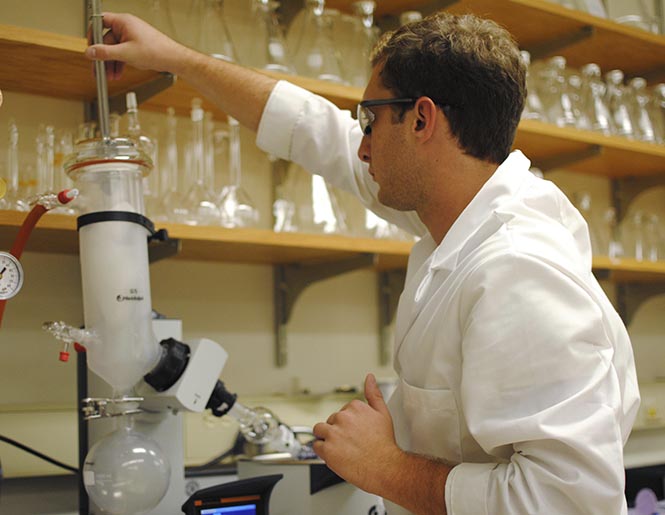State awards Liquid Crystal Institute nearly half a million dollars
Junior biotechnology major Alek Nielsen adds more dry ice to a “roto vap” during research in the biomaterials lab in the liquid crystal building on Friday, September 14. The “roto vap” evaporates solvants to get a more concentrated product. The project involves stem cell research and could last for 5-6 years. Photo by JENNA WATSON.
August 28, 2013
The state of Ohio awarded $459,000 to Kent State’s Liquid Crystal Institute to purchase equipment to pursue biomedical liquid crystal research.
Kent State has been the home of liquid crystal technology, a $2 to $3 billion industry internationally, for more than 40 years, and according to Liquid Crystal Institute director Hiroshi Yokoyama, the state is often willing to give money for additional research in this field.
“We’re in a good position to pursue new opportunities, especially the application of biomedical liquid crystals,” Yokoyama said in a phone interview.
State Rep. Kathleen Clyde (D-Kent) announced the award Aug. 20.
“The Liquid Crystal Institute’s expansion into bioengineering demonstrates Kent State’s leadership among Ohio’s research universities and ensures further economic development for Ohio in the growing biomedical field,” Clyde said in a CityNews USA article.
Biomedical liquid crystal research mainly deals with the use of liquid crystals in medical technology, such as magnetic resonance imaging, or MRI, machines, Yokoyama said.
The main focus of this award from the state, Yokoyama said, will be the development of a smaller, more cost-effective MRI machine.
MRI machines are very expensive due to their size and use of liquid helium, a rare, and therefore costly substance, according to Yokoyama.
The biomedical liquid crystal research and the development of the MRI machine will be a collaboration between the Liquid Crystal Institute and the Department of Biological Sciences.
Small animals, such as mice, will be the test subjects for the MRI machine. Researchers plan to observe the physiological effects of the machine on the animals, Yokoyama said. The Department of Biological Sciences will provide care and facilities for the animals.
“These small animals need to be taken care of in the proper way,” Yokoyama said.
The Department of Biological Sciences, and the biomedical field in general, also uses MRI machines in its work.
“There’s a strong need in the biological sciences to use this kind of MRI machine,” Yokoyama said. “Those people will help us maintain and run our MRI machine in the most effective way, so it makes good sense to collaborate.”
Yokoyama said the Liquid Crystal Institute will also use the award from the state to research liquid crystal-based tissue engineering devices and drug delivery capsules that will carry drugs to a particular part of the body.
Contact Emily Mills at [email protected].

























